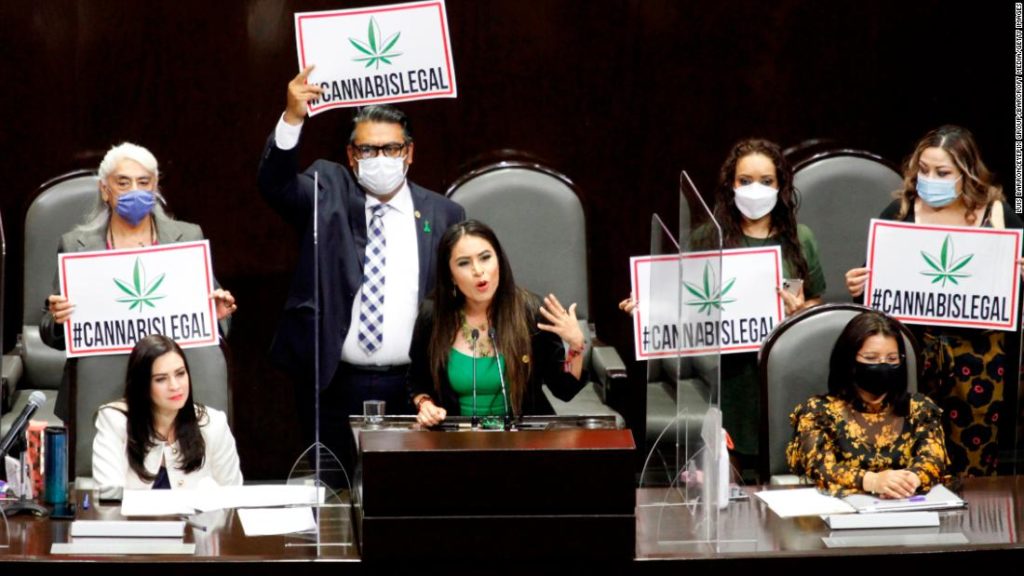“It feels right because it’s for personal use. I don’t have to buy it from organized crime,” he told CNN. “And somehow people no longer see you as a criminal.”
Mexican President Andres Manuel Lopez Obrador has already signaled his approval of the bill.
The legislation is expected to allow adults from the age of 18 up to smoke marijuana, grow as many as eight plants for personal use, and carry up to 28 grams of pot. It will also provide licenses to cultivate, research, and export cannabis.
Zaragoza said that as soon as it becomes law, he will feel safer, “Sometimes I’m scared for the authorities, they can easily arrest me for these plants; this law would make me feel safer at home,” he said.
The General Health Law in Mexico currently allows people to carry up to five grams of cannabis, but carrying more can be cause for prosecution.
Last year, Mexico’s Secretary of National Defense destroyed 2,807 hectares of cannabis plants and seized 244,112 kilograms of the stuff, according to official figures. But Mercado believes that legalizing the drug instead of fighting it could give the country a powerful economic motor.
“We’ve lost an industry that can be powerful during these times of economic crisis, unemployment; we could generate incomes and jobs, this is important,” she said.
Mexico is the most significant foreign source for marijuana in the United States; in 2019, US Customs and Border Protection seized nearly 249,000 kilograms of it along its southwestern border, according to the Drug Enforcement Administration’s 2020 National Drug Threat Assessment.
However, according to the same report, cannabis grown and produced in the US — where it is already legal in several states — has already supplanted Mexican-grown products in the American market.
Legalization amid Mexico’s drug trade
Many in Mexico hope legalizing cannabis will remove one source of income from the country’s powerful and violent drug cartels.
But experts say the historically high homicide rates partly associated with gang violence — Mexico saw 34,515 homicides in 2020 alone — are unlikely to decrease with the legalization of marijuana.
“It will affect (organized crime) in some ways, but when it comes to crime figures, it won’t impact at all,” said Mexico City-based security analyst Eduardo Guerrero, who added that cartel-related deaths are typically linked to activities other than the sale of cannabis.
“The violence and executions are no longer related to pot-selling; most of the hitmen in the country that generate violence are in other businesses. They are trafficking cocaine and heroin to the US, extorting people, and trafficking migrants,” he said.
Éctor Jaime Ramírez, a Congressman from the National Action Party who voted against the legalization bill, tells CNN, “We’re pretty sure that (legalization) won’t reduce violence because there’s no evidence that it happened in another country.”
However, legalizing cannabis in Mexico could reduce the threats that Mexican consumers face when buying it. “The real merit goes to the young people that want to buy it; they don’t have to go to hidden spots and suffer aggressions or be recruited as dealers,” Guerrero said.
Young people in Mexico are vulnerable to be recruited, robbed, or hurt while buying drugs from dealers. Common selling points are located in dangerous neighborhoods, and anything can happen during the purchase.
“Buying weed from a dealer is dangerous; I haven’t done it for a while, but it was complicated,” said Zaragoza, puffing on his joint as he spoke. “You don’t know who you’ll find. You might get robbed.”
You may also like
-
Afghanistan: Civilian casualties hit record high amid US withdrawal, UN says
-
How Taiwan is trying to defend against a cyber ‘World War III’
-
Pandemic travel news this week: Quarantine escapes and airplane disguises
-
Why would anyone trust Brexit Britain again?
-
Black fungus: A second crisis is killing survivors of India’s worst Covid wave

